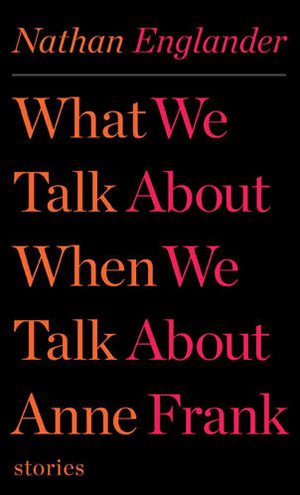 Aisles
Aisles
No Easy Punch Lines
What We Talk About When We Talk About Anne Frank
by Nathan Englander
Review by Wendy Bourgeois
 he adjective “Jew-y” has been bubbling up from the cultural id lately. I’ve heard it four or five times in the last month, always in the context of one Jewish person talking to another of course, about childhood, as in: “My parents were pretty Jew-y, but not as Jew-y as yours,” or “We only ate the Jew-y food on holidays.” Fascinating, because where I grew up you’re either saved or heathen, and that is that—reassuring, the way certainties always are.
he adjective “Jew-y” has been bubbling up from the cultural id lately. I’ve heard it four or five times in the last month, always in the context of one Jewish person talking to another of course, about childhood, as in: “My parents were pretty Jew-y, but not as Jew-y as yours,” or “We only ate the Jew-y food on holidays.” Fascinating, because where I grew up you’re either saved or heathen, and that is that—reassuring, the way certainties always are.
In What We Talk About When We Talk About Anne Frank, Nathan Englander eschews certainty in favor of the whole bewildering strata of contemporary Jewishness. His characters stretch from the secular NPR and Starbucks crowd to “ORTHODOX ULTRAS, now with more deep healing power” and mine the fault line of violence, Anti-Semitism, and sexual shame bonding them all together.
The titular story marries a Raymond Carver style domestic drama to the dark fact of the Holocaust when four old friends meet for a spontaneous afternoon of drinking and getting high on marijuana pilfered from a teenaged son of the suburban hosts. The narrator squirms in the company of the guest couple, now Orthodox Israelies. At first they appear cartoonish in their head gear and Hebrew names, but Englander makes swift work of both the host’s and his reader’s presumptions. He’s got a special knack for this—creating characters so culturally clichéd as to make Woody Allen cringe, but also too vivid and particular for easy punch lines.
In fact, at plot level, many of the stories could be bad jokes, like a rich lawyer goes to a peep show and runs into three rabbis. And even though the lawyer, rabbis, and stripper behave as expected, we are still surprised. These corny surface details tremble under the weight of real pessimism and obsession with death, two Jewish stereotypes most humans relate to. Gallows humor, always a favorite distraction from death, promises at least the momentary release of a grim chuckle. Englander’s stories suggest the laugh, but ultimately betray it for a more wrenching intimacy.
 Wendy Bourgeois is a poet and writer. Her poems "Dear Beloved Other" appeared in the spring 2011 issue.
Wendy Bourgeois is a poet and writer. Her poems "Dear Beloved Other" appeared in the spring 2011 issue.


